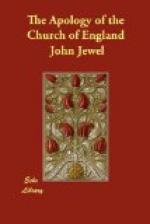the people the right serving of God, and brought them
to worship the golden calves, lest perchance they
might afterward change their mind and slip away, getting
them again to Jerusalem to the temple of God, there
he exhorted them with a long tale to be steadfast,
saying thus unto them: “O Israel, these
calves be thy gods. In this sort commanded your
God you should worship Him, for it should be wearisome
and troublous for you to take upon you a journey so
far off, and yearly to go up to Jerusalem, there to
serve and honour your God.” Even after
the same sort every whit, when these men had once
made the law of God of non-effect through their own
traditions, fearing that the people should afterward
open their eyes and fall another way, and should somewhence
else seek a surer mean of their salvation, Jesu, how
often have they cried out, “This is the same
worshipping that pleaseth God, and which He straitly
requireth of us, and wherewith He will be turned from
His wrath. That by these things is conserved
the unity of the Church. By these all sins be
cleansed, and consciences quieted, and that whoso departeth
from these hath left unto himself no hope of everlasting
salvation.” For it were wearisome and
troublous, say they, for the people to resort to Christ,
to the Apostles, and to the ancient fathers, and to
observe continually what their will and commandment
should be. This ye may see, is to “withdraw
the people of God from the weak elements of the world,
from the leaven of the Scribes and Pharisees, and from
the traditions of men.” It were reason,
no doubt, that Christ’s commandments and the
Apostles’ were removed, that these their devices
might come in place. O just cause, I promise
you, why that ancient and so long allowed doctrine
should be now abolished, and a new form of religion
be brought into the Church of God.
And yet whatever it be, these men cry still that nothing
ought to be changed: that men’s minds are
well satisfied herewithal: that the Church of
Rome, the Church which cannot err, hath decreed these
things. For Silvester Prierias saith, that the
Romish Church is the squire and rule of truth, and
that the Holy Scripture hath received from thence authority
and credit. “The doctrine,” saith
he, “of the Romish Church is the rule of most
infallible faith, from the which the Holy Scripture
taketh his force. And indulgences and pardons,
saith he, are not made known to us by the authority
of the Scriptures, but they are made known to us by
the authority of the Romish Church, and of the Bishops
of Rome, which is greater.” Pighius also
letteth not to say, that without the license of the
Romish Church, we ought not to believe the very plain
Scriptures. Much like as if any of those that
cannot speak pure and clean Latin, and yet can babble
out quickly and readily a little some such law Latin
as serveth the court, would needs hold that all others
ought also to speak after the same way which Mammetrectus
and Catholicon spake many years ago, and which themselves




